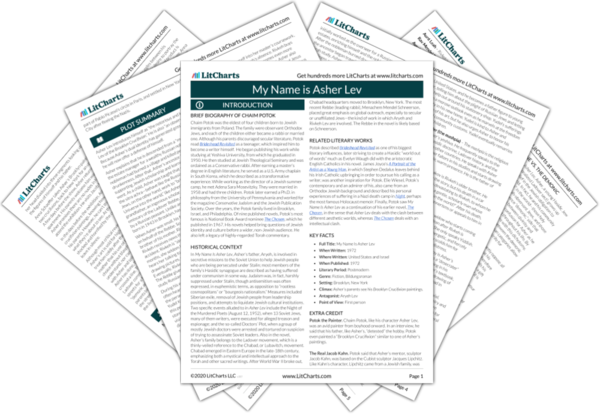The living room window in the Lev family’s apartment symbolizes the pain and longing of physical, emotional, an ideological separation among family members. Aryeh prays before the window when his wife, Rivkeh, is ill and he feels emotionally distant from her. Asher looks out the window to watch his father leave on trips. Most significantly, Rivkeh waits there whenever she longs for Asher or Aryeh’s return from school, work, or travel. Although standing at the window will not reunite Aryeh, Rivkeh, or Asher with each other any sooner, the act itself takes on a sort of religious, prayer-like devotion as they wait. It’s Rivkeh’s stance at the window that Asher specifically adopts in his Brooklyn Crucifixion paintings, symbolizing Rivkeh’s anguish as she longs for her loved ones’ safe homecoming. At the end of the novel, both Rivkeh and Aryeh stand at the window, watching as Asher leaves them and Brooklyn behind for good. His parents’ somber position at the window ultimately represents the irreparable emotional and physical separation between Asher and them, after Asher has scandalized his family and his community with his provocative art exhibition.
Window Quotes in My Name is Asher Lev
Trapped between two realms of meaning, she had straddled both realms, quietly feeding and nourishing them both, and herself as well. I could only dimly perceive such an awesome act of will. But I could begin to feel her torment now as she waited by our living-room window for both her husband and her son. What did she think of as she stood by the window? Of the phone call that had informed my father of her brother’s death? Would she wait now in dread all the rest of her life, now for me, now for my father, now for us both—as she had once waited for me to return from a museum, as she had once waited for my father to return in a snowstorm? And I could understand her torment now; I could see her waiting endlessly with the fear that someone she loved would be brought to her dead. I could feel her anguish.










